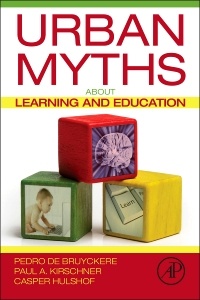Urban Myths about Learning and Education
Auteurs : De Bruyckere Pedro, Kirschner Paul A., Hulshof Casper D.

Many things people commonly believe to be true about education are not supported by scientific evidence. Urban Myths about Learning and Education examines commonly held incorrect beliefs and then provides the truth of what research has shown. Each chapter examines a different myth, with sections on learning, the brain, technology, and educational policy. A final section discusses why these myths are so persistent. Written in an engaging style, the book separates fact from fiction regarding learning and education.
Recognize any of these myths?
- People have different styles of learning
- Boys are naturally better at mathematics than girls
- We only use 10% of our brains
- The left half of the brain is analytical, the right half is creative
- Men have a different kind of brain from women
- We can learn while we are asleep
- Babies become smarter if they listen to classical music
These myths and more are systematically debunked, with useful correct information about the topic in question.
1. The Big Clear-Out 2. Myths about Learning 3. Neuromyths 4. Myths about Technology in Education 5. Myths in Educational Policy 6. Myth Persistence and Myth Busting
Paul A. Kirschner (1951) is professor of Educational Psychology and Director of the Fostering Effective, Efficient and Enjoyable Learning environments (FEEEL) program at the Welten Institute, Research Centre for Learning, Teaching and Technology at the Open University of the Netherlands as well as Visiting Professor of Education with a special emphasis on Learning and Interaction in Teacher Education at the University of Oulu, Finland. He is an internationally recognized expert in his field. A few notable examples of this is that he was President of the International Society for the Learning Sciences (ISLS) in 2010-2011, his election to both the ISLS CSCL Board and the Executive Committee of the Society and the fact that he is an AERA Research Fellow (the first European to receive this honor). He is currently a member of the Scientific Technical Council of the Foundation for University Computing Facilities (SURF WTR) in the Netherlands and was a member of the Dutch Educational Council and, as such, was advisor to the Minister of Education (2000-2004). He is chief editor of the Journal of Computer Assisted Learning, associate editor of Computers in Human Behavior, and has published a very successful book Ten Steps to Complex Learning (now in its second revised edition and translated/published in Korea and China). He also co-edited two other books (Visualizing Argumentation and What we k
- Debunks common myths about learning and education
- Provides empirical research on the facts relating to the myths
- Utilizes light-hearted, approachable language for easy reading
Date de parution : 03-2015
Ouvrage de 226 p.
15.2x22.8 cm



